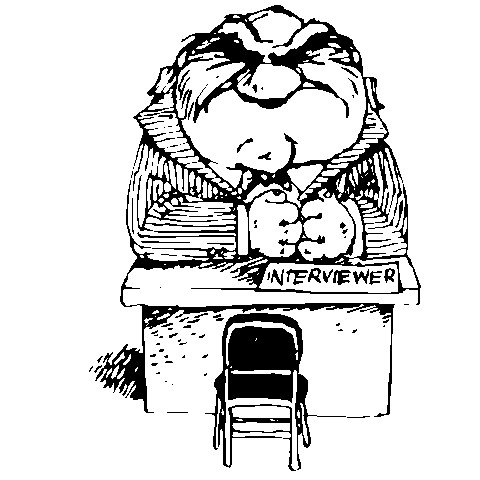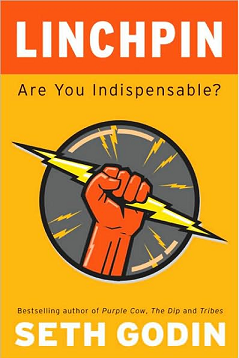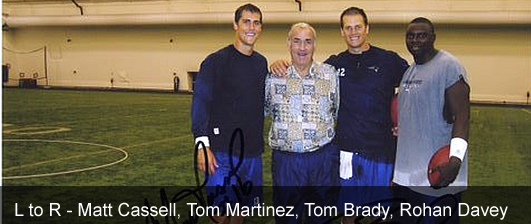
There is a fundamental difference between leaders and managers. The manager will lead her group through the jungle with a machete, hacking away and clearing a path for the group to follow.
A leader, however, will climb the tallest tree and discover that they are actually heading in the totally wrong direction.
(paraphrased from Jim Collins, Good to Great)
Are you blindly working away day after day? Head down in your outlook calendar managing this week’s tasks and your “to-do” lists, delegating cleaning duties and administrative responsibilities or have you taken a moment to climb the tallest tree and discover that the work you’re so busy at on a daily basis is actually keeping you from realizing that you’re heading in the wrong direction?
The challenge of course is putting down the blackberry and looking up long enough to realize that you’re actually trapped in a hamster wheel. Hint: Hacking away will only keep the wheel spinning. The only way to get out is to climb the tallest tree.
Art Horne is the Coordinator of Care and Strength & Conditioning Coach for the Men’s Basketball Team at Northeastern University, Boston MA. He can be reached at a.horne@neu.edu.
Topics:
Art Horne,
Good to Great,
discipline,
development,
Leadership

They say it’s not what you know, but who you know.
They’re right. But take it a step further; it’s not WHO you know, but HOW you know someone.
It’s easy to meet someone at a conference, send them a LinkedIN connection and, voila, that person is permanently in your network. But I recently went through my LinkedIN “network” and realized I don’t even know who some of those people really are. What kind of network is that??? The same holds true for Facebook: How many of your “friends” do you consider your friends in real life?
Social networks like LinkedIN and Facebook are simple and often fake. Real networks take time to cultivate and develop. Shoot an email to someone when their team or school is in the news. Pick up the phone to ask for advice. Send a note if a somebody loses a loved one. A real network is about people looking out for one another.
So when that dream job finally opens up at that company you’ve always wanted to work for, a good networker will pick up the phone and feel comfortable calling to ask for that recommendation. A great networker, meanwhile, doesn’t need to call because that person on the other end already knows who you are and what you’re capable of.
Mark Harris
Associate Director, Athletics Annual Giving
Loyola University Maryland
Topics:
basketball resources,
Good to Great,
customer service,
everything basketball,
development,
networking

Every four years, athletic administrations across the country conduct student-athlete exit interviews. It’s a time where student-athletes can reflect on their athletic achievements and make comments like how a pineapple-lemonade soda machine would have been helpful in the student-athlete lounge or a Swedish masseuse would have been nice during their training. They hand it in, administration pats themselves on the back noting that the student-athlete didn’t make any “realistic” comments on problems that they could have fixed and then the paper is quickly crumpled and discarded in the nearest receptacle.
The problem with these exit interviews is that they provide little opportunity for improvement. First, the feedback is not asked in real time. Do you really want to wait four years to fix a problem that could have been addressed at the end of the first semester?
Second, the questions are never specific or thought provoking … it’s usually a formality put into place so that management can have a safety net to fall back on, claiming after a problem surfaces that they did their due diligence and asked for comments year after year, “how was I suppose to know that our cafeteria wasn’t open past our last practice time? I asked for general comments every year.”
Lastly, asking for general comments only ensures you of one thing: general, non-specific comments in return (read: vanilla). If you are serious about making change, then your questions will reflect this. Asking specific questions regarding the hours of operation of your facility and if it meets the needs of your student-athletes will evoke a much different response then simply asking for comments about the Athletic Training Room or Strength and Conditioning Room in general. Basically, specific questions generate qualified comments.
I once heard a story of a department that placed a suggestion box out for their customers to leave comments in. They didn’t read them of course; but having customers leave suggestions made them feel as if they had a voice, they said. Talk about a lost opportunity to tap into your customer base.
Is your exit process an interview or does it provide opportunity?
Art Horne is the Coordinator of Care and Strength & Conditioning Coach for the Men’s Basketball Team at Northeastern University, Boston MA. He can be reached at a.horne@neu.edu.
Topics:
Art Horne,
hockey conference,
motivation,
customer service,
development

A friend of mine recently left his job at a major academic institution where he worked his way up from the ground floor into a middle management position before leaving for the upper ranks at a competitor’s on the west coast. As a courtesy to the organization in which he had given so much, and so much given to him, he approached his superior's administrative assistant and asked if there was a formal “exit interview” that he was to partake in prior to his final day at the end of the week.
“Usually only people that want to complain ask for exit interviews,” the administrative assistant explained, “did you still want to speak with him?”
“ummm, well, no, not anymore,” my friend replied.
Wouldn’t an exit interview be the perfect opportunity to gain feedback into your organization’s weaknesses, customer service, and operating procedures?
Sure the employee may be salty that they are leaving, but what chance for feedback do you have otherwise once they’ve walked out the door?
You should search out that employee and simply ask, “what can we do better?” This is the only time they won’t be afraid to tell you exactly how it is. You can sift through the salt and substance after, but once they’re gone, they’re gone, and hence so is the opportunity for your organization to improve.
Art Horne is the Coordinator of Care and Strength & Conditioning Coach for the Men’s Basketball Team at Northeastern University, Boston MA. He can be reached at a.horne@neu.edu.
Topics:
Art Horne,
basketball resources,
Ownership,
Good to Great,
discipline,
customer service,
everything basketball,
development,
managing

We’ve all done this at one time or another; walk into a weight room, watch an athlete train, and know exactly who their strength coach was or what strength coach programmed their training.
Whether you know Tony Testa, Director of Sports Medicine at Seton Hall or not, you’d know exactly which kids he taught the Olympic lifts to and which ones he didn’t. Tony is a perfectionist and a first rate teacher of the Olympic lifts, in fact, probably the best I’ve ever seen. Whether he was helping out in the weight room during training or implementing the clean as part of his rehabilitation program, his athletes are a direct reflection of his affection for the Olympic lifts.
With other strength coaches, its bench press Mondays. 10 sets of Bench… doesn’t matter if you have time for anything else.
“I’ve competed in bench press competitions so you’ll bench too.”
On the flip side, you’ll find other “performance coaches” with little actual training experience avoid weights all together.
“It’s all about flexibility. Feel the stretch”
So what exercises are your athletes performing today, or should I say, which ones are they not doing simply because you don’t perform them yourself? Are you looking to fill in the gaps or just simply looking to fill time?
Art Horne is the Coordinator of Care and Strength & Conditioning Coach for the Men’s Basketball Team at Northeastern University, Boston MA. He can be reached at a.horne@neu.edu.
Topics:
Art Horne,
basketball resources,
Strength & Conditioning,
hockey conference,
Ownership,
development,
Leadership

Is just an excuse for not wanting to do the work required to get a project shipped.
If your boss truly won’t let you, it’s probably because you are asking the wrong questions.
If you want your boss to support you during a project which will ultimately reward you if it works, but punishes the boss if fails then of course you’re asking the wrong questions.
What exactly won’t your boss let you do?
Did you investigate it? Research it? Find a gap in your current operating procedures that is worth filling? Does it fit into your core principles? Values?
If the answer is yes, and your boss really won’t let you, then you might want to find another job where your boss supports the extraordinary work that you’re doing.
Unless of course, your happy with ordinary?
(rant inspired by Seth Godin and his most recent book, Linchpin)
Art Horne is the Coordinator of Care and Strength & Conditioning Coach for the Men’s Basketball Team at Northeastern University, Boston MA. He can be reached at a.horne@neu.edu.
Topics:
basketball conference,
Strength & Conditioning,
Ownership,
discipline,
athletic training books,
customer service,
development,
Seth Godin

“Almost all the master coaches I met followed Wooden’s rule. They wanted to know about each student so they could customize their communications to fit the larger patterns in a student’s life.”
Famed football coach and quarterback specialist, Tom Martinez, has a vivid metaphor for this process.
“The way I look at it, everybody’s life is a bowl of whipped cream and shit, and my job is to even things out,” he said. “If a kid’s got a lot of shit in his life, I’m going to stir in some whipped cream. If a kid’s life is pure whipped cream, then I’m going to stir in some shit.”
(Excerpt from, The Talent Code by Daniel Coyle)
Looking at some of Tom's successes it's clear his recipe might just be working.
Art Horne is the Coordinator of Care and Strength & Conditioning Coach for the Men’s Basketball Team at Northeastern University, Boston MA. He can be reached at a.horne@neu.edu.
Topics:
basketball performance,
athletic training conference,
Strength & Conditioning,
Sports Pyschology & Mental Training,
The Talent Code,
Daniel Coyle,
autonomy,
development,
Leadership

Its the end of fall camp and everyone is feeling a bit run down at work and lacking the needed umph to muster a smile. May I suggest a quick read that is sure to place a smile not only on your face, but also on the faces of your co-workers and customers. Fish, by Lundin, Paul and Christensen is the true story of The Pike Place Fish Market where fish are tossed from worker to worker and comic relief comes free of charge. For all those that haven't read it the four main points are outlined below and provide for a nice framework to build your day around, in addition to a break from the traditional management style.
1. Choose your attitude
There is always a choice about the way you do your work, even if there is not a choice about the work itself.
2. Play
“We can be very serious about our jobs without being very serious about ourselves” - Fish
3. Make their day
Find someone who needs a helping hand, a word of support, or a good ear – and make their day.
4. Be present
“talk to them as if they were a long lost friend”
- Fish
So go ahead and throw a fish and have some fun at work tomorrow. Just be sure to wash your hands after.
Art Horne is the Coordinator of Care and Strength & Conditioning Coach for the Men’s Basketball Team at Northeastern University, Boston MA. He can be reached at a.horne@neu.edu.
Topics:
basketball conference,
athletic training conference,
Strength & Conditioning,
discipline,
customer service,
development,
Leadership

In a recent post by Seth Godin he challenges one’s normal approach to problem solving which is usually the “wait to be inspired then act” method and asks us to instead actively seek out inspiration.
Seth states, “Simple example: start a blog and post once a day on how your favorite company can improve its products or its service. Do it every day for a month, one new, actionable idea each and every day. Within a few weeks, you'll notice the change in the way you find, process and ship.”
My challenge to you is to take Seth’s example of blogging, but instead of blogging about your favorite company, write down one new actionable idea each and every day this coming month that will improve your department’s service to your student-athletes. It may be as simple as greeting each athlete or patient with a high five as they enter your office or as complex as a new pre-participation exam that actually screens them for risk factors that matter. Or how about an idea that will provide your staff with more opportunities to ship?
Once you’ve committed to writing down these ideas you’ll not only discover there are a number of easy ways to improve your services, but you’ll actually find yourself leading others to the trough of change.
Warning: you can lead a co-worker to water, but you can’t make them drink. But gosh darn it, seeing you drink first makes it a whole lot easier for others to drink the cool-aid.
Art Horne is the Coordinator of Care and Strength & Conditioning Coach for the Men’s Basketball Team at Northeastern University, Boston MA. He can be reached at a.horne@neu.edu.
Topics:
athletic training,
Strength & Conditioning,
motivation,
Ownership,
Good to Great,
discipline,
customer service,
evidence based medicine,
development,
Leadership,
managing

A good friend from Australia sent me this clip about workplace motivation. Besides the awesome animation, it’s just under 11 minutes and worth every second of it.
It may surprise you that monetary incentives are not the lead motivator in the workplace, but instead the three factors that lead to better performance and personal satisfaction are:
Autonomy: desire to be self directed.
Mastery: our urge to become better.
Purpose: When profit motive becomes unmoored from purpose motive bad things happen (bad customer service, crappy products, etc).
How does this change your management strategy this week?
Art Horne is the Coordinator of Care and Strength & Conditioning Coach for the Men’s Basketball Team at Northeastern University, Boston MA. He can be reached at a.horne@neu.edu.
Topics:
basketball conference,
athletic training conference,
athletic training,
Strength & Conditioning,
motivation,
autonomy,
purpose,
mastery,
Good to Great,
discipline,
customer service,
development












